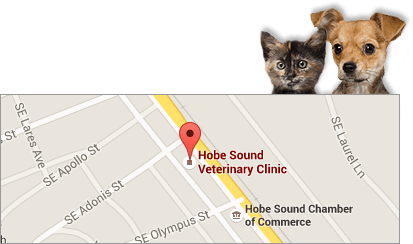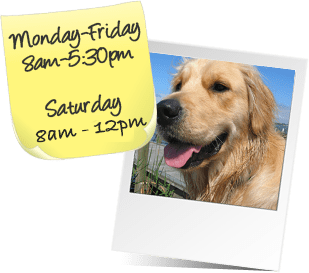Your Labrador retriever Lance has undergone a striking transformation. Your eight-year-old canine companion has always been an athletic dog, racing through the dog park and enjoying beach runs. Even with his hearty appetite, and tendency to scarf up the cat’s food, he remained at a normal weight. When he turned seven, however, he cut back on exercise without decreasing his food intake. Now, his stomach swings when he walks. You don’t want Lance to suffer from joint pain, diabetes, liver issues, or other weight-related problems. That’s why your Hobe Sound, FL vet will give him a physical exam and prescribe a weight-loss diet. Until then, learn more about your canine housemate’s weight challenges.
Informal Weight Checks
Give your canine housemate an unofficial weight test. If you can feel his backbone and palpate his ribs without difficulty, he’s within a healthy weight range. However, if you must burrow your hands into his chest before you notice the ribs, he’s probably packing on some weight.
Try another weight gauge. Stand above your curious dog, and look straight down at him. Ideally, you’ll notice a “waist” between the back of his rib cage and his hips. If this sounds like a different dog, he could benefit from nutritional counseling.
How Your Dog Gains Weight
If Lance consumes a specific number of daily calories, and burns them up with vigorous workouts, he’ll probably stay at a normal weight. However, he generally eats everything possible before taking a nap.
While he’s asleep, his body doesn’t need those excess calories; and they’re stored as unwelcome fat. Unfortunately, Labs and their pug cousins are susceptible to weight gain. Older dogs are also more prone to pile on pounds.
Weight Management Program
Record every morsel Lance consumes for a defined time period. Write down details of his exercise routine. Although you’re tempted to fudge the numbers in his favor, the vet needs a realistic picture of his habits.
Next, the vet will design a tailored weight management program for Lance. Feed him only from his bowl, and strictly follow her advice regarding treats. Pair his diet with daily vet-approved exercise. To learn more about how our tailored “Vet Nutrition and Weight Management” services can help manage your pet’s weight effectively, visit our service page.
Over time, your canine companion will decrease his appetite, expend more calories, and raise his resting metabolic rate. Your Hobe Sound, FL vet will fine-tune his diet. If your dog should slim down, or if you’re interested in engaging more with a community of pet lovers, consider learning more about “Social Petworking Month“, which focuses on promoting pet health and networking. Contact us, your local animal clinic in Hobe Sound, FL for expert advice.





